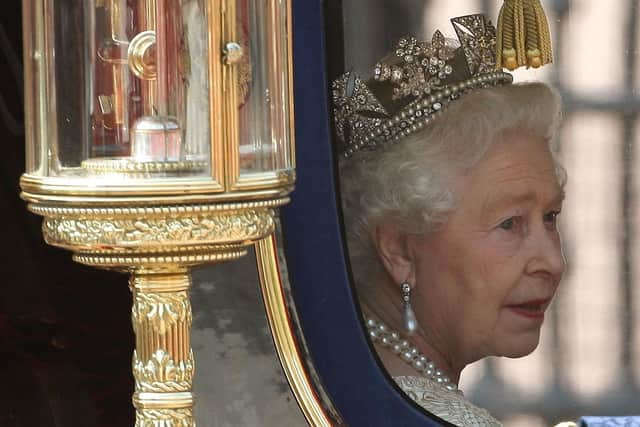Queen's diamond diadem and jewellery going on show
Set with 1,333 brilliant-cut diamonds, the priceless crown, made for George IV's extravagant coronation in 1821, has been worn countless times by Elizabeth II during her reign and is probably the most well recognised of all her pieces of jewellery.
The Queen, who asked the Prince of Wales to open Parliament and read the Queen's Speech for the first time on Tuesday, usually wears the diadem for her journey to and from the State Opening.
Advertisement
Hide AdAdvertisement
Hide AdThe crown will be on view with other historic jewellery in the State Rooms of Buckingham Palace during the Royal Collection's summer opening from July 22 to October 2 as part of an exhibition exploring the Queen's accession.


It features a narrow band of diamonds edged with pearls, surmounted by four crosses-pattee, the front cross set with a pale yellow brilliant diamond, and floral sprays of a rose, a thistle and shamrocks representing national emblems.
In 1952, just days after she acceded to the throne, the Queen wore the diadem for official portraits by Dorothy Wilding, which formed the basis for the monarch's image on millions of postage stamps from 1953 to 1971.
Visitors will also be able to examine other heirloomed pieces of jewellery worn by the Queen for her sittings with Wilding including the Delhi Durbar necklace.
Incorporating nine emeralds, the glittering necklace also features an 8.8 carat diamond pendant cut from the Cullinan diamond, the largest diamond ever found.
It was made for the Queen's grandmother Queen Mary for the 1911 Delhi Durbar staged in India to mark George V's coronation.
At Windsor Castle, a series of the Queen's emblem brooches will be presented including the poignant Flame-Lily Brooch, the emblem of Zimbabwe, which was pinned to the Queen's mourning clothes after the death of her father George VI.
The new Queen wore the piece when she set foot on British soil for the first time as monarch after flying back from Kenya.
Advertisement
Hide AdAdvertisement
Hide AdRoyal fans will also be able to see the Canadian Maple Leaf Brooch, worn by Princess Elizabeth on her first visit to Canada in 1951 and many times since, and the New Zealand Silver Fern Brooch, presented by the Women of Auckland on Christmas Day in 1953.
Also there will be the Australian Wattle Brooch which was a gift on her first visit to Australia in 1954, and the Sri Lanka Brooch, given to the Queen during a state visit in 1981.
The Windsor exhibition, from July 7 to September 26, will focus on the Queen's Coronation and will include the Coronation Dress and Robe of Estate.
At the Palace of Holyroodhouse in Edinburgh, a display, from July 3 to September 25, commemorating past jubilees will feature a collection of outfits worn by the Queen during her Silver, Golden and Diamond Jubilee celebrations
A pale turquoise dress and coat embroidered with scattered silver flowers with a coordinating hat by the Queen's senior dresser Angela Kelly will be exhibited for the first time.
Also there will be the ceremonial key to the Palace of Holyroodhouse, which is presented to the monarch at the start of Royal Week at the Palace each summer.
Comments
Want to join the conversation? Please or to comment on this article.